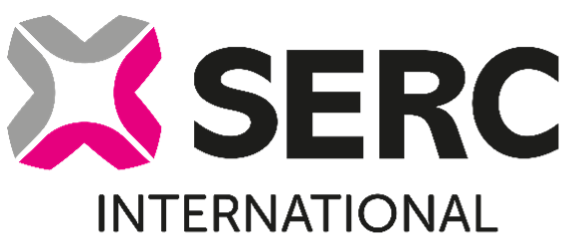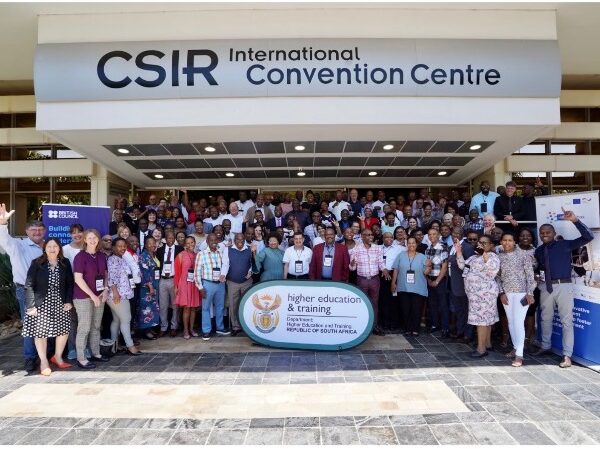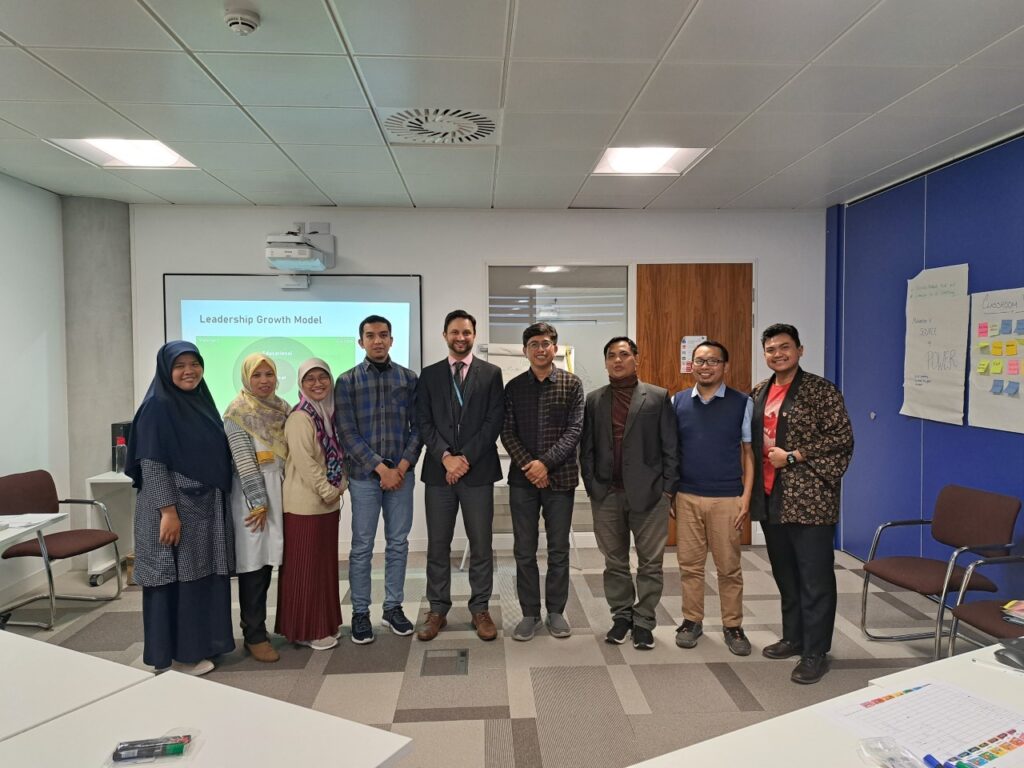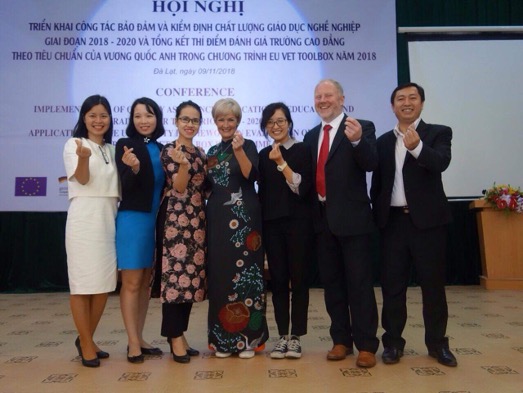Enhancing Quality Assurance in South Africa
There are 50 colleges in South Africa under the umbrella of Department for Higher Education and Training (DHET). Standards of functionality and ability to serve their students varied across the College network. SERC worked with an in-country consultant and representatives of DHET to support the development of an institutional Maturity Model for the TVET Colleges with an associated assessment instrument to raise quality standards across the network.
South East Regional College (SERC) shared their “best in practice” Self-Evaluation and Quality Improvement” framework, robust evaluation and reporting methodology and provided ongoing mentoring support to DHET. This intervention resulted in the development of a Maturity Model tailored to the needs of the South African TVET sector which has a student-centred cultural approach and focusses on people, processes, structures and technology. The 18-month project combined a series of virtual stakeholder meetings, a study visit to SERC, a pilot implementation programme and a dissemination event in Pretoria, South Africa.
The Department of Higher Education and Training (DHET) was established in 2009 and oversees universities, TVET colleges and other post-secondary education in South Africa. The political head of the department is the Minister of Higher Education and Training. The Department’s mission is to develop capable, well-educated and skilled citizens who are able to compete in a sustainable, diversified and knowledge-intensive international economy, which meets the development goals of the country.
The Department will undertake this mission by: reducing skills bottlenecks, especially in priority skills areas; improving participation rates in the system; correcting distributions in the shape, size and distribution of access to post-school education and training; and improving the quality and efficiency in the system, its subsystems and institutions. The responsibility of the TVET branch of DHET is to plan, develop, monitor, maintain and evaluate national policy, programmes, assessment practices and systems for vocational and continuing education and training and provides the framework, coordination and support to the TVET colleges for the efficient and effective management, governance and delivery of vocational and occupational programmes, and manages the TVET colleges’ subsidies and transfers.
There are 50 colleges in South Africa who are uneven in their functionality and ability to serve their students. Therefore, DHET requested support from a UK institution with the development of an institutional Maturity Model tailored to the South African context for TVET Colleges and an associated assessment instrument.
The Maturity Model of TVET Colleges and the associated assessment instrument will be used by DHET to evaluate the Colleges in defined and selected areas, such as governance and leadership, finance, human resources and labour relations, education and training, examination and assessment, student support, infrastructure, occupational health & safety and ICT Governance. The model will provide a support mechanism to DHET that will help the Department to focus support on those TVET Colleges or on specific operational areas of the Colleges where it is needed the most.
This will mean that certain functions will be delegated to those Colleges that demonstrate the maturity that they can perform the required function/s themselves without DHET intervention. In this way stronger Colleges can be more independent and flexible in their approach whilst weaker Colleges will receive more focused attention from the Department.
Over the past 15 years, SERC has embedded a unique self-evaluation and quality improvement framework based on a clear, supportive strategic direction, robust evidence and data, professional discussions, nationally understood standards and manageable incremental targets. Over that time the framework underwent several iterations with the focus on improving the student learning experience.
SERC quality improvement expertise was utilised in this project to support the DHET team to develop a Maturity Model that was based on UK and European best practice but was given a clear and specific South African context and flavour.
This was not a simple copy of a pre- existing model but was closely aligned to frameworks, practices and well- embedded processes currently used by TVET Colleges in South Africa. This approach ensured that duplication of process did not take place ensuring that a further bureaucratic process was not introduced that failed to address key issues. Rather, the model was developed with the specific emphasis on practical application to ensure adoption of the model across the College network.
SERC’s quality consultant worked in partnership with a local South African consultant and the DHET team to facilitate the development of the framework within a South African context. The process was slow as it took time to clarify the expected outcomes and be fully understood by the participants (College Principals). However, referring to international quality improvement models was important in legitimising the Maturity Model development.
This approach, whilst difficult, resulted in a high level of acceptance from College Principals and DHET officers which may have been harder to achieve had a simple ‘graft-on’ approach been used. The role of the South African consultant with the DHET representative in marrying local practices within the framework was important to a positive outcome. This included the development of key data and performance targets aligned to current policies and procedures.
The positive working relationships between the British Council team and DHET helped development. The DHET representative took ownership of the project and helped drive the outcomes. The level of commitment shown across the South African partnership aided in smoothing out possible opposition and concerns. Time was taken to explain the model and listen to feedback from the TVET sector. The British Council South African consultant has strong working relationships across the sector and acted as an ‘honest broker’ throughout.
Once the model had been developed the South African team supported by SERC consultant implemented the first stage of the pilot to seven Colleges within a range of TVET settings. Following this phase, the Maturity Model was evaluated at a national level taking College feedback into consideration before a full rollout across the sector.
As the model relies on well understood databases and national policies and procedures a series of supporting documentation was created to help the implementation of the model, namely: Maturity Model Guidelines; Maturity Model Assessment Framework; Practice Notes and Templates.
The model, when fully implemented, can result in empowering local Colleges to manage improvements to meet regional and national education expectations and outcomes.
To summarise, SERC worked closely with the team in South Africa to develop:
- A unique model referenced to international model
- Rooted in on the local, regional and national context
- Developed collaboratively and implemented professionally
- Embracing and refining international concepts of self-evaluation, quality improvement and development
- Focused on improving the outcomes for students and learners
In contextualising the South Africa Maturity Model closely to regional and national need there are significant opportunities for sustainable results. The model provides improvement and action planning at all levels for both DHET and the TVET colleges which can be adapted depending on policy issues and other local issues faced by the sector. The model will develop self- evaluation skills to encourage ownership of education standards and further developments through timely, realistic improvement planning.
The role of critical friends (DHET regional officers and college management level) encourages sharing of experience and collegial action planning. The model relies on sound data sources, encourages further shared understanding across the sector of standards and expected activities to support education standards. The shared system will provide a useful feedback loop on the impact of national policy as well as providing measurable operational improvement.
The main outcome of this project is a fully operational Quality Assurance Maturity Model tailored to the needs within the South African TVET sector to measure the effectiveness of each College in key areas such as governance and leadership, finance, human resources and labour relations, education and training, examination and assessment, student support, infrastructure, occupational health & safety and ICT Governance.
The model has the full support of the Ministry for Education and will be implemented across all 50 Colleges by 2024 with the main aim of raising standards, providing high performing Colleges with autonomy and flexibility to operate “at arm’s length” whilst supporting lower performing Colleges as they process through the improvement journey and raise standards.
The ultimate impact will be on students as the implementation of the Maturity Model will raise teaching and learning standards across the sector leading to improved outcomes for students in terms of achievement and career prospects.
By 2020 SERC had achieved its aspiration to deliver change to support the NI economy by becoming a world class College. SERC is the most successful College in Northern Ireland (Department for Economy) having built a strong, professional, skilled team; developed global partnerships; and built skills centres that widen participation, support social mobility and provide a highly skilled and qualified workforce.
The College’s 2030 strategic focus is on maintaining our quality provision, delivering a curriculum that meets industry needs, and providing value for money. SERC’s mission is to “shape our community, by promoting an innovative and entrepreneurial society through maintaining an inclusive learning environment, which will empower and enable individuals to fulfil their ambitions”.
Internationalisation is one of 7 key strategic priorities for the College: to develop international partnerships to enhance student, staff and business opportunities. The remaining priorities will address social inclusion, enhance student capabilities, lead economic development, support lifelong learning, promote and support healthy and resilient students and staff.
SERC provides technical, vocational and professional training from entry to Master’s level to 12,500 full and part-time students. Our self-evaluation and quality improvement process is embedded across all areas of the College and subject to external scrutiny by Education & Training Inspectorate (NI).
Inspections have resulted in the highest grade since 2012. This robust approach has led to 93% retention, 91% achievement and 94% overall student satisfaction rate (2022/3).
South Eastern Regional College – SERC
SERC International – SERC











